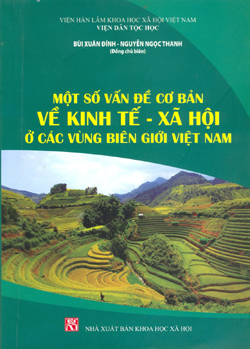
Based on the research results of the Ministerial-level project in the same name, the book Some basic socio-economic issues in the border areas of Vietnam co-edited by Assoc.Prof.Dr. Bui Xuan Dinh and Assoc.Prof.Dr. Nguyen Ngoc Thanh focused on some basic socio-economic issues in the border areas of Vietnam in order to establish the scientific foundations for proposing the policies and solutions to help the border areas have sustainable development, potential for international integration.
The book is divided into 4 chapters as follows:
Chapter 1: Some basic economic issues in the border areas of Vietnam at present; Preliminarily introduced the border areas of Vietnam - China, Vietnam - Laos, Vietnam - Cambodia with the factors affecting the economy - society of the groups of peoples living there, specifically: cross-border economic relations, groups of people in the border area and border trade economy and employment, working away across the border, natural, social, residential conditions...
Chapter 2: Issues on hunger and poverty, development difference and influence of the social factors of group of peoples on development in the border areas; stated the actual state of hunger and poverty that the groups of people in the border areas are facing; specified the influences arising from the residence characteristics, traditional economic structure, land ownership, education level, psychology, personality, awareness to rise of the compatriots of the ethnic minorities and the other influences related to the customs and habits.
Chapter 3: Issues on social evils and criminal crimes in the border areas. This part presented the factors that give rise to social evils and crimes including: Influence of geographical, population, same family, kinship factors and influences due to the socio-economic conditions of the neighboring countries. Specified the type of crime, social evils with the main focus on drug trafficking, trafficking in women and children, smuggling and trade fraud.
Chapter 4: Issues on opportunities and challenges for the development. By analyzing specifically the context, development trends with positive factors (such as the Party and State have more renovations, awareness of the position and role of the border issues, expand cooperation with the neighboring countries to create opportunities for the development of the border areas, benefits of the economic corridors...), the book pointed out the challenges due to the natural conditions, from the inside of the economy - society, the promulgation and implementation of policies... From there, presented the recommendations related to the problem-solving viewpoints of the competent authorities as well as of the people for economic development (specifically in the forestry, agricultural, industrial – trade production, dealing with the social evils such as drug through the movements “safe village, safe commune, post-detoxification management... in combination with the education system development, improvement of intellectual standards of the people, training resources for the youth of the ethnic groups in the border areas...
Pham Vinh Ha







